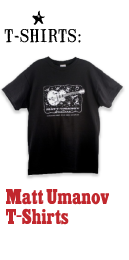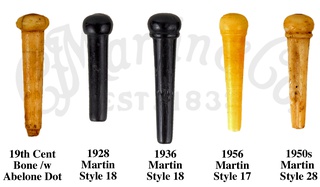
Vintage Bridge Pins
Bridge pins. Really? Who’d be interested in something as seemingly minor and ancillary as vintage bridge pins? Apparently, and judging by the responses I’ve gotten from so many of you regarding the twenty or thirty sets I’ve put up on my website recently, quite a number of you. I’ve culled these from what must be hundreds of them that I’ve accumulated in the fifty-plus years I’ve been involved in guitar restoration and repair, with the focus mostly mostly being on American-made instruments, from the 1830s to well, very recently, though many 19th-century European guitars have of course come through here as well. What you’ll see on the Parts & Accessories page and on the Just In page of my site are complete (and some partial) sets that are mostly, though not all, from Martin guitars of all ages. The oldest ones are made of bone, most of them with abalone dots, or “eyes” in their centers, a common accoutrement for the better-grade European guitars of old and also seen on the earliest of Martins. It is interesting that while true elephant ivory was often used for tuning pegs and body bindings, literally all of the early bridge pins I've seen were of bone; I have no idea why. Many plainer pins of the day were also of ebony, with or without those dots. Once the 20th-century starts to loom, with the development of synthetics made from nitrates in the late 19th-century (celluloid, in common parlance), we see the white body bindings on better Martins change from ivory to to Ivoroid, a trade name for celluloid with ivory-like grain. This stuff was also quite popular at the time for things like cutlery handles, makeup-mirror backings, and the like. Martin bridge pins start to become made from synthetics somewhere in the ‘teens. I have yet to identify their chemical composition; looks and feels sorta like a phenolic though I don’t think that stuff was around that early. Any chemists among you know? You’ll see a few sets of these, from the 1920s, on my website, both black and white. These early ones were short by today’s standards and had no grooves in them. Getting into the mid-1930s, they become noticeably longer, even a bit more so than today’s and still with no grooves. Pins like this are seen on Martins through the 1940s; by sometime in the 50s we see what are basically the same type of pins that we see today, made from a plastic that again, I’ll ask the chemists among you to identify. A styrene, maybe? The bridge pins from the 50s-60s-70s did seem to be a bit soft though, and it’s rare today to see any that have not become at least bit distorted with use; pins of the last thirty years or so are of a more durable plastic. What seems like an almost hilarious sidelight regarding those Martin pins from around the 1950s-60s that were for style-28 guitars, the white pins with the little red dots in the center, is that the company that made them for Martin either would not, or didn’t know how to, make them with the dots already in them and so they were all sent to Martin as just plain white. The way the dots got in there was that one or two of the lower-paid people there, perhaps maintenance staff would, for extra pay, come in after-hours, drill little holes in the tops of the pins, glue in red dots, and polish them down. As much as this story sounds apocryphal and that someone was pulling my leg, I believed him then and believe it now. I still have a few good friends at Martin who’ve been there more than forty years, and while none of them were there in the 60s, I think I’m going to ask next time I speak with them.
Thought there wasn't much to say about the lowly bridge pin? So did I, but If I was nerdy enough to write it and you were nerdy enough to read this far…… And please take note that in addition to the ones already up on my site I’ve got tons more singles of old ones: ebony, both with and without dots; bone both with and without dots; and Martin pins from the 20s through the 70s, short and long, black and white, styles 17, 18, 21 (black with white or Ivoroid dot), 28, and 45. You’re welcome to email…. info@umanovguitars.com …. with specific requests.






